Huawei's Global Strategy: Cultural Dimensions and Expansion Report
VerifiedAdded on 2020/05/28
|9
|1774
|33
Report
AI Summary
This report provides a cultural analysis for Huawei's international expansion into Mexico, Australia, and Germany. It applies Hofstede's cultural dimensions to compare and contrast the cultural profiles of China with these three countries. The report highlights similarities and differences across dimensions such as power distance, individualism, masculinity, uncertainty avoidance, and long-term orientation. Recommendations are provided to assist Huawei in adapting its strategies to effectively operate within the unique cultural contexts of each country, ensuring effective communication and successful market entry. The report emphasizes the importance of understanding local values and adapting marketing strategies to resonate with the target audiences, particularly in Germany, a feminine society, where clear communication and respect for national values are crucial for success.
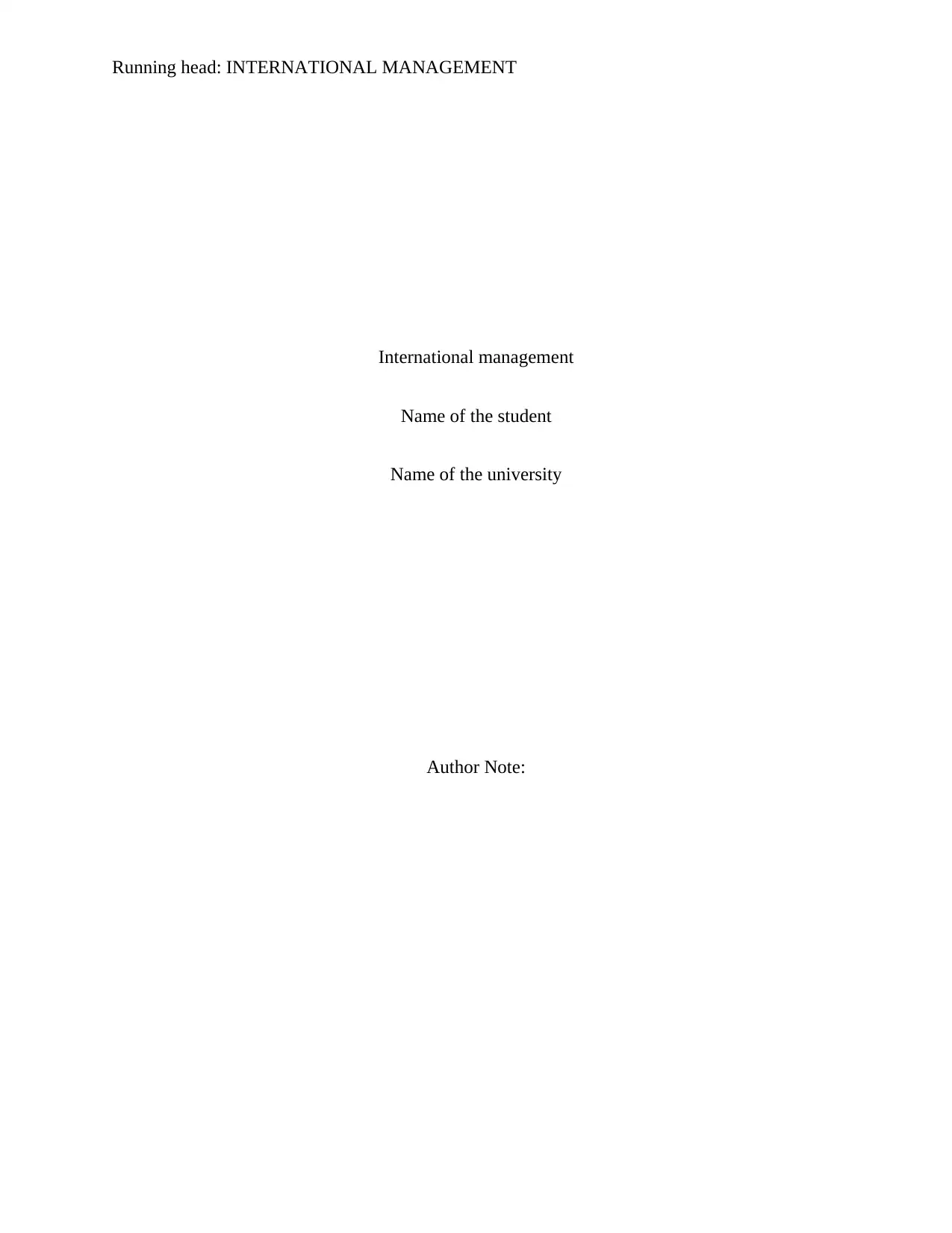
Running head: INTERNATIONAL MANAGEMENT
International management
Name of the student
Name of the university
Author Note:
International management
Name of the student
Name of the university
Author Note:
Paraphrase This Document
Need a fresh take? Get an instant paraphrase of this document with our AI Paraphraser
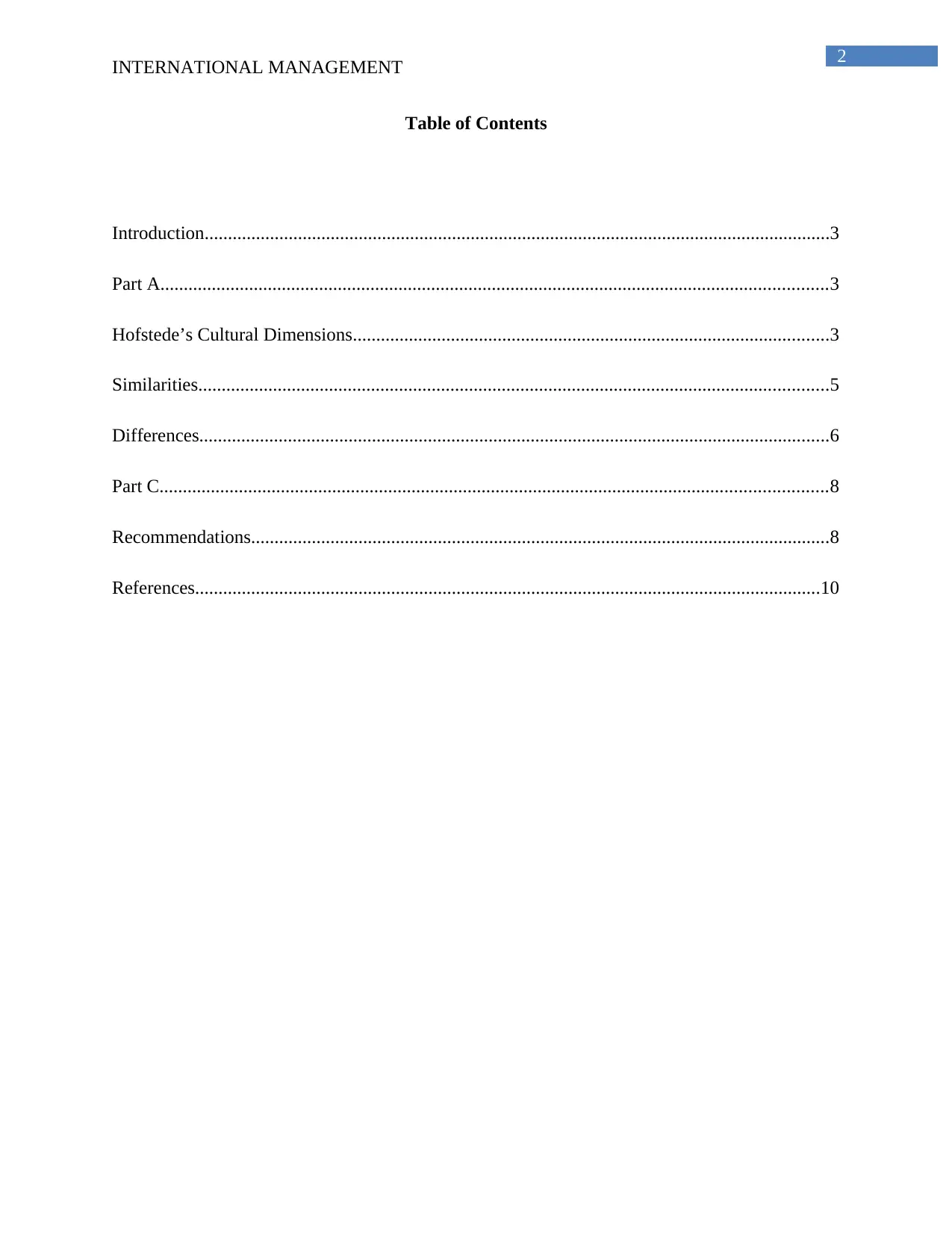
2
INTERNATIONAL MANAGEMENT
Table of Contents
Introduction......................................................................................................................................3
Part A...............................................................................................................................................3
Hofstede’s Cultural Dimensions......................................................................................................3
Similarities.......................................................................................................................................5
Differences.......................................................................................................................................6
Part C...............................................................................................................................................8
Recommendations............................................................................................................................8
References......................................................................................................................................10
INTERNATIONAL MANAGEMENT
Table of Contents
Introduction......................................................................................................................................3
Part A...............................................................................................................................................3
Hofstede’s Cultural Dimensions......................................................................................................3
Similarities.......................................................................................................................................5
Differences.......................................................................................................................................6
Part C...............................................................................................................................................8
Recommendations............................................................................................................................8
References......................................................................................................................................10
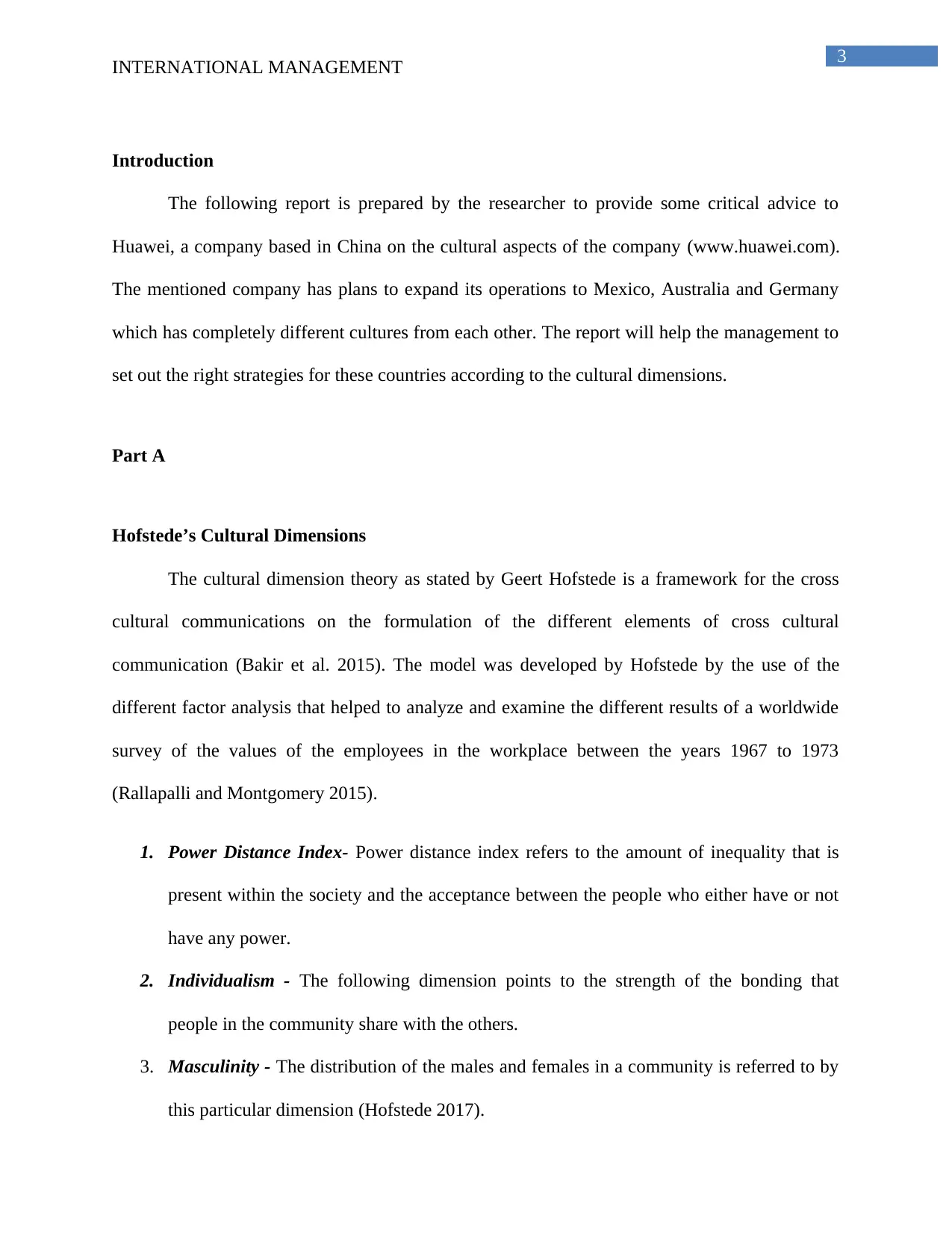
3
INTERNATIONAL MANAGEMENT
Introduction
The following report is prepared by the researcher to provide some critical advice to
Huawei, a company based in China on the cultural aspects of the company (www.huawei.com).
The mentioned company has plans to expand its operations to Mexico, Australia and Germany
which has completely different cultures from each other. The report will help the management to
set out the right strategies for these countries according to the cultural dimensions.
Part A
Hofstede’s Cultural Dimensions
The cultural dimension theory as stated by Geert Hofstede is a framework for the cross
cultural communications on the formulation of the different elements of cross cultural
communication (Bakir et al. 2015). The model was developed by Hofstede by the use of the
different factor analysis that helped to analyze and examine the different results of a worldwide
survey of the values of the employees in the workplace between the years 1967 to 1973
(Rallapalli and Montgomery 2015).
1. Power Distance Index- Power distance index refers to the amount of inequality that is
present within the society and the acceptance between the people who either have or not
have any power.
2. Individualism - The following dimension points to the strength of the bonding that
people in the community share with the others.
3. Masculinity - The distribution of the males and females in a community is referred to by
this particular dimension (Hofstede 2017).
INTERNATIONAL MANAGEMENT
Introduction
The following report is prepared by the researcher to provide some critical advice to
Huawei, a company based in China on the cultural aspects of the company (www.huawei.com).
The mentioned company has plans to expand its operations to Mexico, Australia and Germany
which has completely different cultures from each other. The report will help the management to
set out the right strategies for these countries according to the cultural dimensions.
Part A
Hofstede’s Cultural Dimensions
The cultural dimension theory as stated by Geert Hofstede is a framework for the cross
cultural communications on the formulation of the different elements of cross cultural
communication (Bakir et al. 2015). The model was developed by Hofstede by the use of the
different factor analysis that helped to analyze and examine the different results of a worldwide
survey of the values of the employees in the workplace between the years 1967 to 1973
(Rallapalli and Montgomery 2015).
1. Power Distance Index- Power distance index refers to the amount of inequality that is
present within the society and the acceptance between the people who either have or not
have any power.
2. Individualism - The following dimension points to the strength of the bonding that
people in the community share with the others.
3. Masculinity - The distribution of the males and females in a community is referred to by
this particular dimension (Hofstede 2017).
⊘ This is a preview!⊘
Do you want full access?
Subscribe today to unlock all pages.

Trusted by 1+ million students worldwide
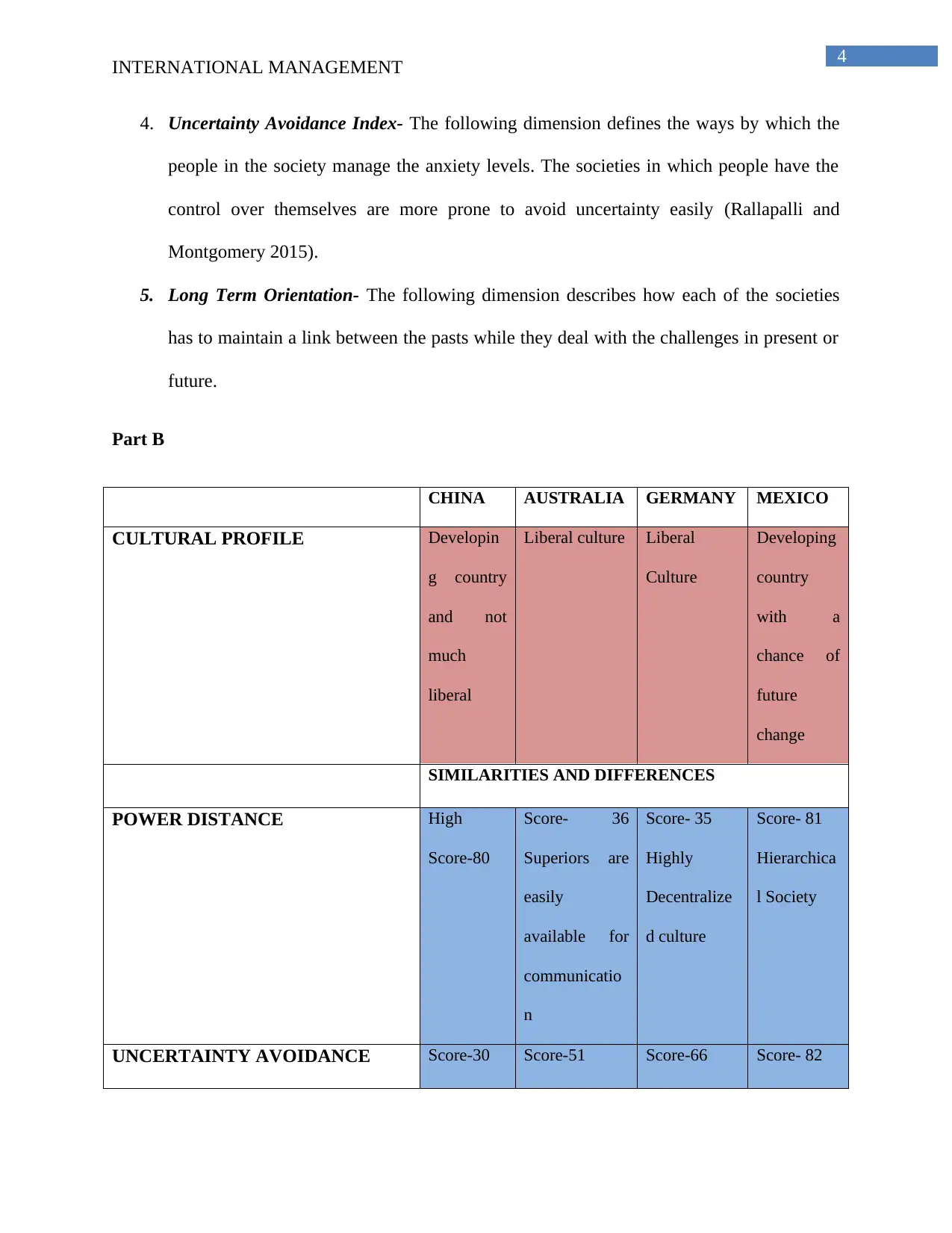
4
INTERNATIONAL MANAGEMENT
4. Uncertainty Avoidance Index- The following dimension defines the ways by which the
people in the society manage the anxiety levels. The societies in which people have the
control over themselves are more prone to avoid uncertainty easily (Rallapalli and
Montgomery 2015).
5. Long Term Orientation- The following dimension describes how each of the societies
has to maintain a link between the pasts while they deal with the challenges in present or
future.
Part B
CHINA AUSTRALIA GERMANY MEXICO
CULTURAL PROFILE Developin
g country
and not
much
liberal
Liberal culture Liberal
Culture
Developing
country
with a
chance of
future
change
SIMILARITIES AND DIFFERENCES
POWER DISTANCE High
Score-80
Score- 36
Superiors are
easily
available for
communicatio
n
Score- 35
Highly
Decentralize
d culture
Score- 81
Hierarchica
l Society
UNCERTAINTY AVOIDANCE Score-30 Score-51 Score-66 Score- 82
INTERNATIONAL MANAGEMENT
4. Uncertainty Avoidance Index- The following dimension defines the ways by which the
people in the society manage the anxiety levels. The societies in which people have the
control over themselves are more prone to avoid uncertainty easily (Rallapalli and
Montgomery 2015).
5. Long Term Orientation- The following dimension describes how each of the societies
has to maintain a link between the pasts while they deal with the challenges in present or
future.
Part B
CHINA AUSTRALIA GERMANY MEXICO
CULTURAL PROFILE Developin
g country
and not
much
liberal
Liberal culture Liberal
Culture
Developing
country
with a
chance of
future
change
SIMILARITIES AND DIFFERENCES
POWER DISTANCE High
Score-80
Score- 36
Superiors are
easily
available for
communicatio
n
Score- 35
Highly
Decentralize
d culture
Score- 81
Hierarchica
l Society
UNCERTAINTY AVOIDANCE Score-30 Score-51 Score-66 Score- 82
Paraphrase This Document
Need a fresh take? Get an instant paraphrase of this document with our AI Paraphraser
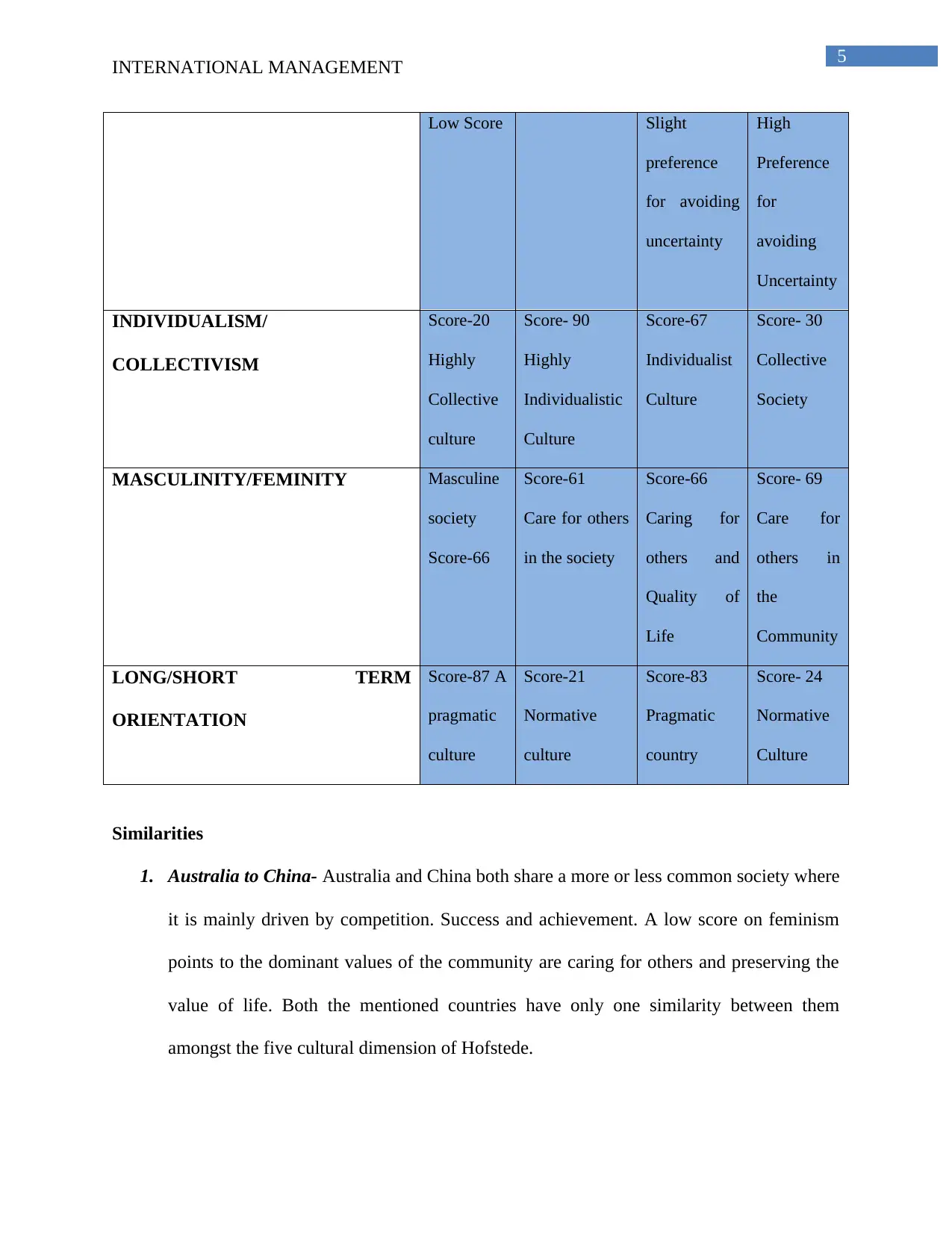
5
INTERNATIONAL MANAGEMENT
Low Score Slight
preference
for avoiding
uncertainty
High
Preference
for
avoiding
Uncertainty
INDIVIDUALISM/
COLLECTIVISM
Score-20
Highly
Collective
culture
Score- 90
Highly
Individualistic
Culture
Score-67
Individualist
Culture
Score- 30
Collective
Society
MASCULINITY/FEMINITY Masculine
society
Score-66
Score-61
Care for others
in the society
Score-66
Caring for
others and
Quality of
Life
Score- 69
Care for
others in
the
Community
LONG/SHORT TERM
ORIENTATION
Score-87 A
pragmatic
culture
Score-21
Normative
culture
Score-83
Pragmatic
country
Score- 24
Normative
Culture
Similarities
1. Australia to China- Australia and China both share a more or less common society where
it is mainly driven by competition. Success and achievement. A low score on feminism
points to the dominant values of the community are caring for others and preserving the
value of life. Both the mentioned countries have only one similarity between them
amongst the five cultural dimension of Hofstede.
INTERNATIONAL MANAGEMENT
Low Score Slight
preference
for avoiding
uncertainty
High
Preference
for
avoiding
Uncertainty
INDIVIDUALISM/
COLLECTIVISM
Score-20
Highly
Collective
culture
Score- 90
Highly
Individualistic
Culture
Score-67
Individualist
Culture
Score- 30
Collective
Society
MASCULINITY/FEMINITY Masculine
society
Score-66
Score-61
Care for others
in the society
Score-66
Caring for
others and
Quality of
Life
Score- 69
Care for
others in
the
Community
LONG/SHORT TERM
ORIENTATION
Score-87 A
pragmatic
culture
Score-21
Normative
culture
Score-83
Pragmatic
country
Score- 24
Normative
Culture
Similarities
1. Australia to China- Australia and China both share a more or less common society where
it is mainly driven by competition. Success and achievement. A low score on feminism
points to the dominant values of the community are caring for others and preserving the
value of life. Both the mentioned countries have only one similarity between them
amongst the five cultural dimension of Hofstede.
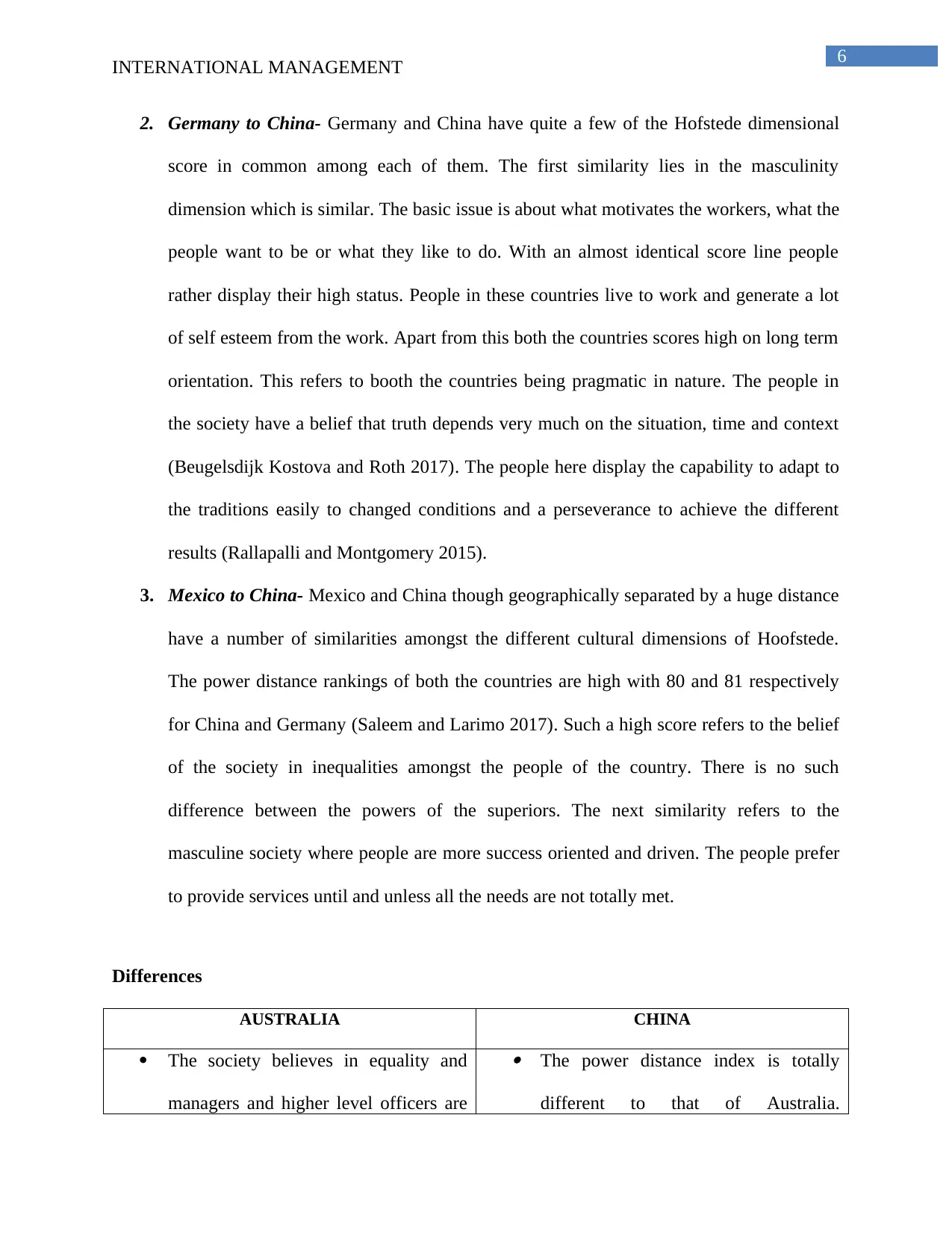
6
INTERNATIONAL MANAGEMENT
2. Germany to China- Germany and China have quite a few of the Hofstede dimensional
score in common among each of them. The first similarity lies in the masculinity
dimension which is similar. The basic issue is about what motivates the workers, what the
people want to be or what they like to do. With an almost identical score line people
rather display their high status. People in these countries live to work and generate a lot
of self esteem from the work. Apart from this both the countries scores high on long term
orientation. This refers to booth the countries being pragmatic in nature. The people in
the society have a belief that truth depends very much on the situation, time and context
(Beugelsdijk Kostova and Roth 2017). The people here display the capability to adapt to
the traditions easily to changed conditions and a perseverance to achieve the different
results (Rallapalli and Montgomery 2015).
3. Mexico to China- Mexico and China though geographically separated by a huge distance
have a number of similarities amongst the different cultural dimensions of Hoofstede.
The power distance rankings of both the countries are high with 80 and 81 respectively
for China and Germany (Saleem and Larimo 2017). Such a high score refers to the belief
of the society in inequalities amongst the people of the country. There is no such
difference between the powers of the superiors. The next similarity refers to the
masculine society where people are more success oriented and driven. The people prefer
to provide services until and unless all the needs are not totally met.
Differences
AUSTRALIA CHINA
The society believes in equality and
managers and higher level officers are
The power distance index is totally
different to that of Australia.
INTERNATIONAL MANAGEMENT
2. Germany to China- Germany and China have quite a few of the Hofstede dimensional
score in common among each of them. The first similarity lies in the masculinity
dimension which is similar. The basic issue is about what motivates the workers, what the
people want to be or what they like to do. With an almost identical score line people
rather display their high status. People in these countries live to work and generate a lot
of self esteem from the work. Apart from this both the countries scores high on long term
orientation. This refers to booth the countries being pragmatic in nature. The people in
the society have a belief that truth depends very much on the situation, time and context
(Beugelsdijk Kostova and Roth 2017). The people here display the capability to adapt to
the traditions easily to changed conditions and a perseverance to achieve the different
results (Rallapalli and Montgomery 2015).
3. Mexico to China- Mexico and China though geographically separated by a huge distance
have a number of similarities amongst the different cultural dimensions of Hoofstede.
The power distance rankings of both the countries are high with 80 and 81 respectively
for China and Germany (Saleem and Larimo 2017). Such a high score refers to the belief
of the society in inequalities amongst the people of the country. There is no such
difference between the powers of the superiors. The next similarity refers to the
masculine society where people are more success oriented and driven. The people prefer
to provide services until and unless all the needs are not totally met.
Differences
AUSTRALIA CHINA
The society believes in equality and
managers and higher level officers are
The power distance index is totally
different to that of Australia.
⊘ This is a preview!⊘
Do you want full access?
Subscribe today to unlock all pages.

Trusted by 1+ million students worldwide
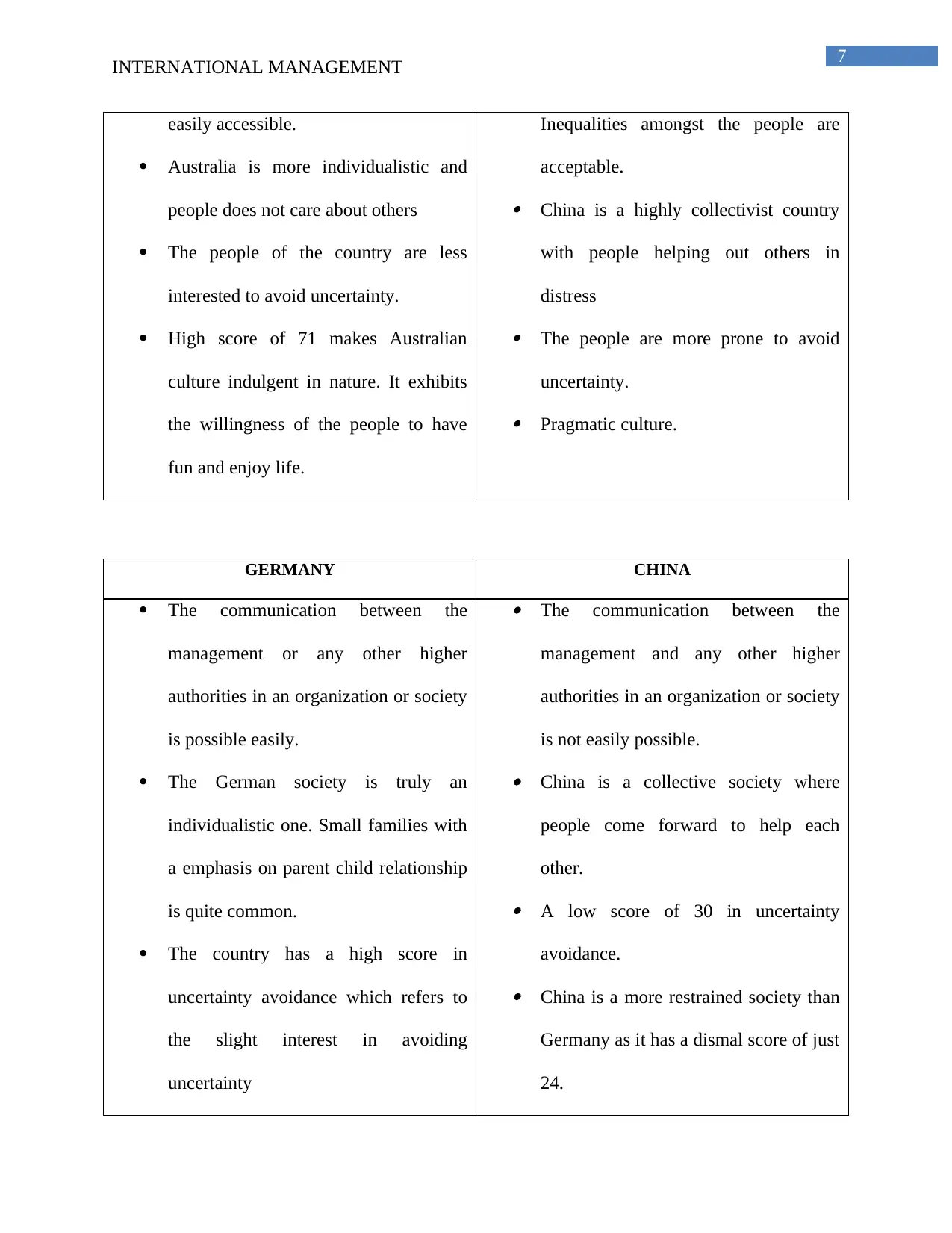
7
INTERNATIONAL MANAGEMENT
easily accessible.
Australia is more individualistic and
people does not care about others
The people of the country are less
interested to avoid uncertainty.
High score of 71 makes Australian
culture indulgent in nature. It exhibits
the willingness of the people to have
fun and enjoy life.
Inequalities amongst the people are
acceptable.
China is a highly collectivist country
with people helping out others in
distress
The people are more prone to avoid
uncertainty.
Pragmatic culture.
GERMANY CHINA
The communication between the
management or any other higher
authorities in an organization or society
is possible easily.
The German society is truly an
individualistic one. Small families with
a emphasis on parent child relationship
is quite common.
The country has a high score in
uncertainty avoidance which refers to
the slight interest in avoiding
uncertainty
The communication between the
management and any other higher
authorities in an organization or society
is not easily possible.
China is a collective society where
people come forward to help each
other.
A low score of 30 in uncertainty
avoidance.
China is a more restrained society than
Germany as it has a dismal score of just
24.
INTERNATIONAL MANAGEMENT
easily accessible.
Australia is more individualistic and
people does not care about others
The people of the country are less
interested to avoid uncertainty.
High score of 71 makes Australian
culture indulgent in nature. It exhibits
the willingness of the people to have
fun and enjoy life.
Inequalities amongst the people are
acceptable.
China is a highly collectivist country
with people helping out others in
distress
The people are more prone to avoid
uncertainty.
Pragmatic culture.
GERMANY CHINA
The communication between the
management or any other higher
authorities in an organization or society
is possible easily.
The German society is truly an
individualistic one. Small families with
a emphasis on parent child relationship
is quite common.
The country has a high score in
uncertainty avoidance which refers to
the slight interest in avoiding
uncertainty
The communication between the
management and any other higher
authorities in an organization or society
is not easily possible.
China is a collective society where
people come forward to help each
other.
A low score of 30 in uncertainty
avoidance.
China is a more restrained society than
Germany as it has a dismal score of just
24.
Paraphrase This Document
Need a fresh take? Get an instant paraphrase of this document with our AI Paraphraser
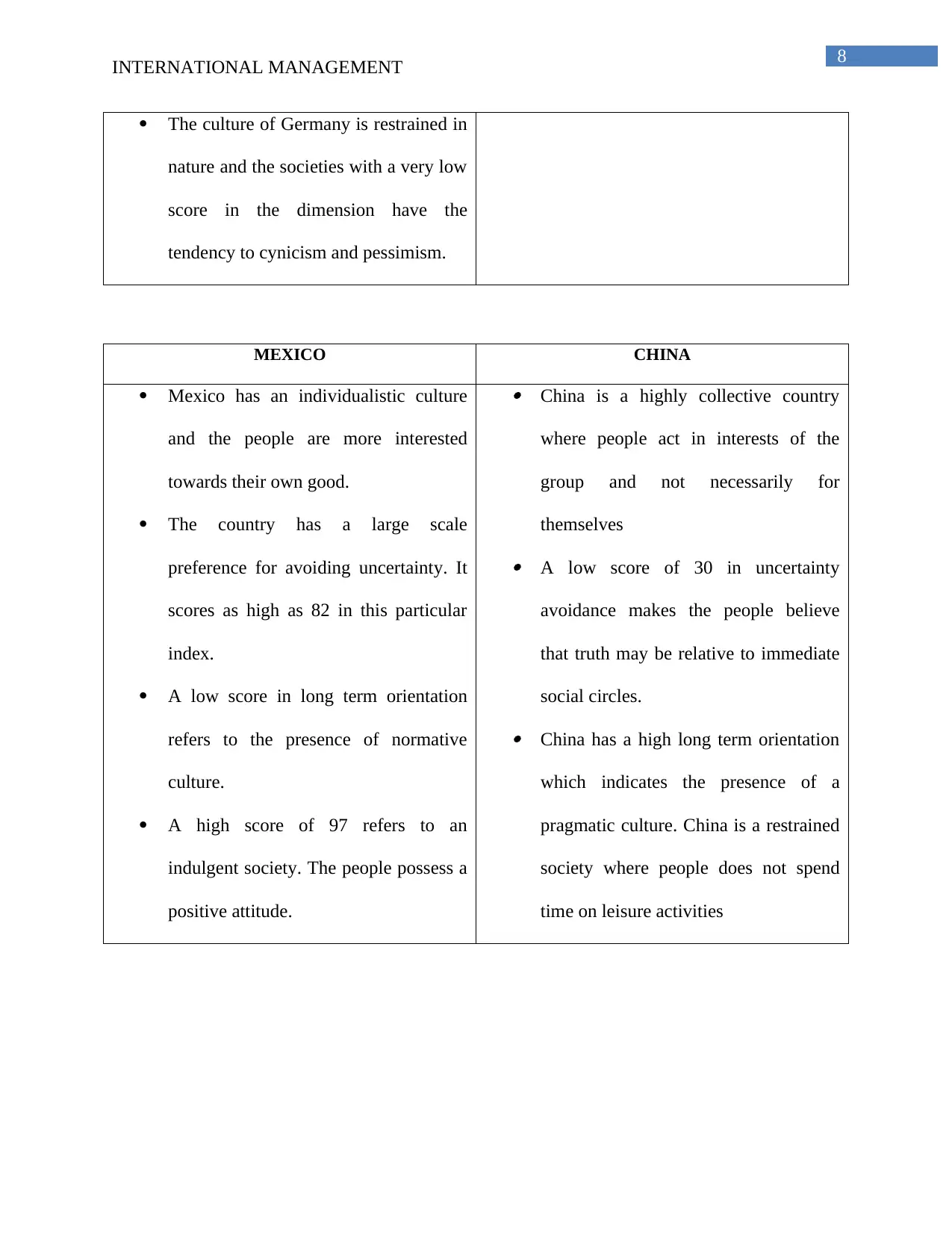
8
INTERNATIONAL MANAGEMENT
The culture of Germany is restrained in
nature and the societies with a very low
score in the dimension have the
tendency to cynicism and pessimism.
MEXICO CHINA
Mexico has an individualistic culture
and the people are more interested
towards their own good.
The country has a large scale
preference for avoiding uncertainty. It
scores as high as 82 in this particular
index.
A low score in long term orientation
refers to the presence of normative
culture.
A high score of 97 refers to an
indulgent society. The people possess a
positive attitude.
China is a highly collective country
where people act in interests of the
group and not necessarily for
themselves
A low score of 30 in uncertainty
avoidance makes the people believe
that truth may be relative to immediate
social circles.
China has a high long term orientation
which indicates the presence of a
pragmatic culture. China is a restrained
society where people does not spend
time on leisure activities
INTERNATIONAL MANAGEMENT
The culture of Germany is restrained in
nature and the societies with a very low
score in the dimension have the
tendency to cynicism and pessimism.
MEXICO CHINA
Mexico has an individualistic culture
and the people are more interested
towards their own good.
The country has a large scale
preference for avoiding uncertainty. It
scores as high as 82 in this particular
index.
A low score in long term orientation
refers to the presence of normative
culture.
A high score of 97 refers to an
indulgent society. The people possess a
positive attitude.
China is a highly collective country
where people act in interests of the
group and not necessarily for
themselves
A low score of 30 in uncertainty
avoidance makes the people believe
that truth may be relative to immediate
social circles.
China has a high long term orientation
which indicates the presence of a
pragmatic culture. China is a restrained
society where people does not spend
time on leisure activities
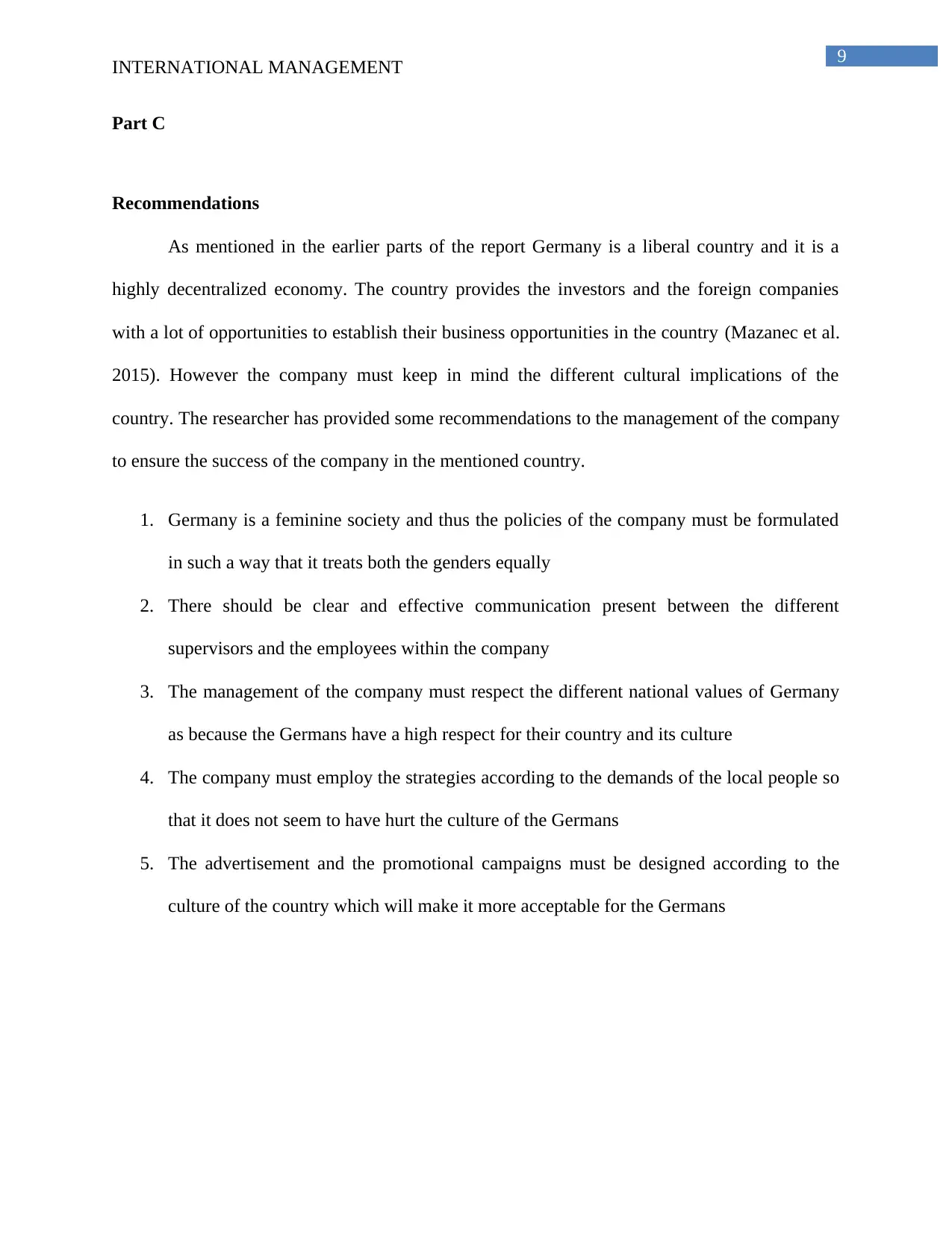
9
INTERNATIONAL MANAGEMENT
Part C
Recommendations
As mentioned in the earlier parts of the report Germany is a liberal country and it is a
highly decentralized economy. The country provides the investors and the foreign companies
with a lot of opportunities to establish their business opportunities in the country (Mazanec et al.
2015). However the company must keep in mind the different cultural implications of the
country. The researcher has provided some recommendations to the management of the company
to ensure the success of the company in the mentioned country.
1. Germany is a feminine society and thus the policies of the company must be formulated
in such a way that it treats both the genders equally
2. There should be clear and effective communication present between the different
supervisors and the employees within the company
3. The management of the company must respect the different national values of Germany
as because the Germans have a high respect for their country and its culture
4. The company must employ the strategies according to the demands of the local people so
that it does not seem to have hurt the culture of the Germans
5. The advertisement and the promotional campaigns must be designed according to the
culture of the country which will make it more acceptable for the Germans
INTERNATIONAL MANAGEMENT
Part C
Recommendations
As mentioned in the earlier parts of the report Germany is a liberal country and it is a
highly decentralized economy. The country provides the investors and the foreign companies
with a lot of opportunities to establish their business opportunities in the country (Mazanec et al.
2015). However the company must keep in mind the different cultural implications of the
country. The researcher has provided some recommendations to the management of the company
to ensure the success of the company in the mentioned country.
1. Germany is a feminine society and thus the policies of the company must be formulated
in such a way that it treats both the genders equally
2. There should be clear and effective communication present between the different
supervisors and the employees within the company
3. The management of the company must respect the different national values of Germany
as because the Germans have a high respect for their country and its culture
4. The company must employ the strategies according to the demands of the local people so
that it does not seem to have hurt the culture of the Germans
5. The advertisement and the promotional campaigns must be designed according to the
culture of the country which will make it more acceptable for the Germans
⊘ This is a preview!⊘
Do you want full access?
Subscribe today to unlock all pages.

Trusted by 1+ million students worldwide
1 out of 9
Related Documents
Your All-in-One AI-Powered Toolkit for Academic Success.
+13062052269
info@desklib.com
Available 24*7 on WhatsApp / Email
![[object Object]](/_next/static/media/star-bottom.7253800d.svg)
Unlock your academic potential
Copyright © 2020–2026 A2Z Services. All Rights Reserved. Developed and managed by ZUCOL.





